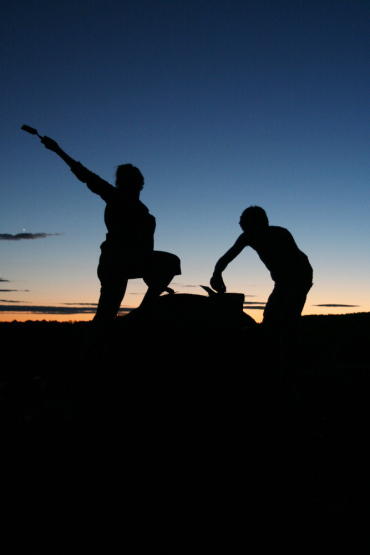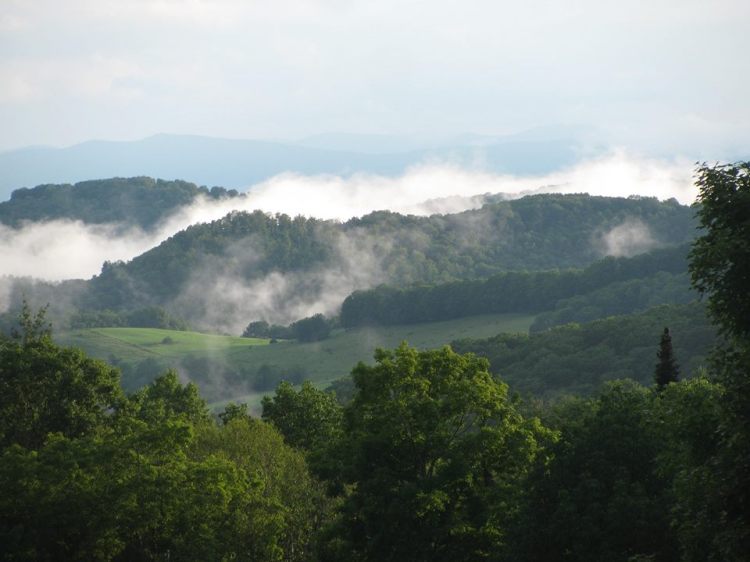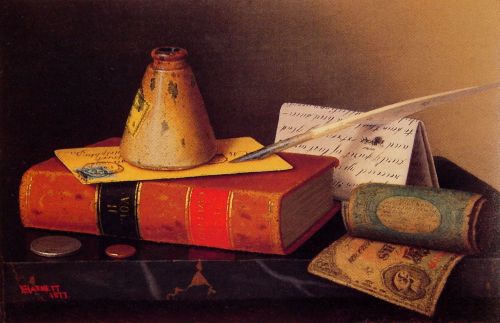
Home! The Sister and I flew in last week, back to wood floors and fireplaces and gourmet pizza, to tramps through the woods in rubber boots and an excess of fuzzy cats. The house smells like moth balls and pine branches and fires and hay. I can discard tailored wool blazers and ironed blouses and dress like a hippie for a month. The Brother has perfected a dozen new yoyo tricks to perform to Rod Stewart turned up too loud. We all have to spend inordinate hours making Christmas cookies and watching Dr. Who. It is simply good to be here.
~~~~~~
Everything is more or less Thomas Mann. He was my independent study topic with the enigmatic German Professor, and took up every spare moment of the semester, as well as many moments that were not spare, to the general bereavement of the research projects. The study was fantastic, one of the best things I have done at the college–a four-month-long discussion of art, music, philosophy, criticism, literature, auf Deutsch, all per Thomas Mann. And he is astounding.
The first half of the semester was Der Tod in Venedig (Death in Venice)–fin de siecle and classicism, a heady and haunting synthesis of pagan gods and decadence and the music of a dead composer from Vienna. And Plato’s Eros, which may well have been the most thrilling discovery of the semester. Read the Symposium and Phaedrus. Creation in Beauty, possession of Beauty–are they all that different? And why does Aschenbach fall so tragically short of both?
Next came the question of salvation, redemption–Erlösung–in Mann. Where was it? Certainly not in Art, that much was certain. Mann was no Romantic, and those who loved Art in his world strayed towards damnation. What then? I was discomfited.
We ought to look at Irony, said the Professor. That was as much a solution in Mann, as much a redemption, as anything he could think of. So we did, in Tonio Kröger and then Beim Propheten (At the Prophet’s), where the Novelist (Mann himself?) day-dreamed about a ham sandwich in the middle of the most mystical revelations. The Professor laughed until he had to wipe his eyes, and said that–ironic laughter–was as good a redemption as any, Emily, and didn’t I agree? I, being a good Wagnerian and thus rather in love with the idea that Through Art All Men Are Saved, didn’t, really.
And then the women. Gerächt (Revenged/Avenged) was Mann’s feminist manifesto, at first glance. Or was it? Was Mann’s treatment of women–in his other works–really any different than that narrow and laughable view he exposed to such ridicule in Gerächt? It all tied into my general uneasiness with the women in the works we were reading in 19th Century Lit, going all the way back to Goethe’s Ewig-Weibliche…..
I got a little carried away.
“You should write a feminist interpretation of Thomas Mann,” said the Professor. “But that’s boring.” I said. “And sad.” I don’t want to be a feminist, I want to be a humanist. And it is ever so much more productive to love these great artists, through and beyond all their short-sightedness and prejudice. Cynicism, disenchantment, and bitterness get one precisely nowhere, as a student, critic, and human being.
~~~~~~
But there was a broader tension, behind it all, something discomfiting about the discussions. By taking Thomas Mann so seriously, by letting him be so vitally important, by allowing–by even demanding–that he speak in the 21st century, were we not at least a little outdated? Are his artistic, cultural, political questions–the questions of nearly one hundred years ago–the questions of today? Could they be? Have we moved beyond Mann’s Munich, Mann’s America?
After the Doktor Faustus discussions, the Professor asked if anyone can create great art now without the Devil. Where can valid artistic inspiration come from, anymore? I wanted to know if he was posing the questions as Thomas Mann or himself, in 1945 Germany or now, in mid-western America at a liberal arts college that believes in Truth, Goodness, and Beauty. He didn’t know. Neither did I.
I asked if he thought Germany would ever produce another towering, all-conquering Artist, Künstler, along the lines of a Goethe or Wagner or Mann. “Welt-erobernd…” he says. “No, I don’t think so. I don’t think they can. That time is long past.” That is heart-breaking, I said. What happened to Faust? What happened to the future?
On the final day of classes, we read the last page of Doktor Faustus, this final book, aloud. Almost impossibly difficult. Is it not a novel for the end of the world? What can follow such final chapters? When art is its own criticism, when the novel as a genre is consummated and destroyed by the very act of its creation–as Wagner did, I said, with Tristan und Isolde–what can come next? It is an end, not a beginning.
But, in differing ways, both the Professor and I came to the conclusion that there is some small hope, some way out. He pointed to the final sentence of the novel, a prayer–one must have hope, he said, one must believe in something, to pray. Prayer, like the question that ends Der Zauberberg, looks towards the future.
And I said, whether blindly and youthfully optimistic or not, that there is often an ending, but always an answer. Mann’s Faustus is not the last ending, nor the first. What about Greek Tragedy, that narrows and narrows and narrows human experience into a dark and endless point? What about King Lear, where they kneel and pray to a God who never comes? Where Howl, Howl, Howl are the only honest words left? Nihilism, denial, renunciation writ large, long before Nietzsche and Schopenhauer. Art could have ended right there–but it didn’t, I said, it didn’t. Look at everything that has come since. I’m not going to go through life believing that Western Culture is in decline because Adrian Leverkühn wrote a twelve-tone Lamentatio and went insane.
~~~~~~
And there it was. A wonderful, difficult semester. And best of all, we are going to start all over again with Robert Musil next year–from what I can tell, a very different creature. Lyric to Mann’s epic, perhaps, all sparkling inner-ness and Gestalt psychology, pace classicism and irony.











